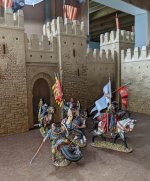- Joined
- Feb 2, 2011
- Messages
- 2,093
JJDESIGNS NEWS UPDATE 28th FEBRUARY 2022
EL CID AND THE RECONQUISTA
THE SPANISH
The age in which El Cid lived has since been termed the “Reconquista”, or Christian reconquest of Spain from the Moors, and was one of the most colourful periods in military history.
The armies are spectacular and varied, ranging from the noble Christian Knights to the Muslim Andalusians, through to the religious zeal of the African invaders, the Almoravids and Almohads.
Although the period is often portrayed as a simple war of religion, it was in fact a great deal more complex, with Muslim commonly fighting Muslim, and Christian fighting Christians, with both sides using allies and mercenaries whenever it suited them.
This period, during the lifetime of El Cid 1040-1100AD saw the rise of heavy cavalry charges and other northern European influences, especially in the kingdoms of Aragon and Catalonia, which had the strongest links to France.
This period involved two forms of campaign. The first involved raids of varying magnitude designed to seize valuables, livestock and prisoners. These expeditions were obviously carried out by mounted troops and were of limited duration.
The longer campaigns had the intention to seize and hold territory. Naturally this involved more troops, especially infantry. The lack of a fully developed feudal system influenced the military organization of this period. Most soldiers were paid mercenaries, but fully armed citizen militias were formed to defend towns and major cities.

Infantry was especially common in larger campaigns, when the infantry militias would be mobilized to serve the king. The Spanish knights were particularly unhappy to fight dismounted,, therefore nearly all infantry were made up from the poorer citizens who could not afford a horse.



Nearly all the warring factions in Spain during this period used local Andalusian troops as allies in their armies.
Andalusian mercenary infantry archers were commonplace and were often deployed behind spearmen in battle.

These figures are perfect as defenders of the Andalusian Castle, and will be available later this year.
Best wishes and many thanks,
john jenkins
EL CID AND THE RECONQUISTA
THE SPANISH
The age in which El Cid lived has since been termed the “Reconquista”, or Christian reconquest of Spain from the Moors, and was one of the most colourful periods in military history.
The armies are spectacular and varied, ranging from the noble Christian Knights to the Muslim Andalusians, through to the religious zeal of the African invaders, the Almoravids and Almohads.
Although the period is often portrayed as a simple war of religion, it was in fact a great deal more complex, with Muslim commonly fighting Muslim, and Christian fighting Christians, with both sides using allies and mercenaries whenever it suited them.
This period, during the lifetime of El Cid 1040-1100AD saw the rise of heavy cavalry charges and other northern European influences, especially in the kingdoms of Aragon and Catalonia, which had the strongest links to France.
This period involved two forms of campaign. The first involved raids of varying magnitude designed to seize valuables, livestock and prisoners. These expeditions were obviously carried out by mounted troops and were of limited duration.
The longer campaigns had the intention to seize and hold territory. Naturally this involved more troops, especially infantry. The lack of a fully developed feudal system influenced the military organization of this period. Most soldiers were paid mercenaries, but fully armed citizen militias were formed to defend towns and major cities.

Infantry was especially common in larger campaigns, when the infantry militias would be mobilized to serve the king. The Spanish knights were particularly unhappy to fight dismounted,, therefore nearly all infantry were made up from the poorer citizens who could not afford a horse.



Nearly all the warring factions in Spain during this period used local Andalusian troops as allies in their armies.
Andalusian mercenary infantry archers were commonplace and were often deployed behind spearmen in battle.

These figures are perfect as defenders of the Andalusian Castle, and will be available later this year.
Best wishes and many thanks,
john jenkins


